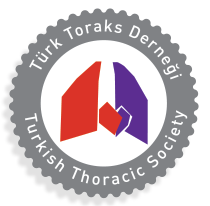Abstract
Abstract
An important portion of the population living in İçel frequently visit moderate altitudes. The aim of this study was to investigate the effect of moderate altitude on pulmonary functions, blood gases and QT dispersion in the elderly patients with COPD.
Twenty-eight individuals, aged betweeen 59 and 78 years (16 with COPD and 12 healthy persons) were included in the study. Pulmonary function tests, CO diffusion capacity, arterial blood gas analysis, complete blood count and electrocardiogram recordings were performed at sea level. After three days of ascent to moderate altitude, between 1000 and 2000 meters, the same tests were repeated. At moderate altitudes in COPD patients, the mean FEV1% (p<0.05), FEV1/FVC (p=0.001), DLCO/VA (p<0.05) and PaO2 (p<0.001) were found to be significantly decreased. However, in the control group, only DLCO/VA (p<0.01) and PaO2 (p<0.05) parameters were found to be decreased. There were no significant correlations between the level of altitude and the changes of the pulmonary functions, blood gas parameters, QT dispersion and hematocrite after the visit to moderate altitudes. Multivariate and covariance analysis showed that the presence of COPD was an important factor causing impairments of pulmonary functions and CO diffusion capacity in elderly population at moderate altitudes (p=0.015). However, there was no additional effect of COPD on blood gas parameters at moderate altitudes.
In conclusion, it was observed that in the elderly patients with COPD, moderate altitudes caused impairment in pulmonary functions. However, the presence of COPD did not have a predictive effect on blood gas parameters, QT dispersion and hematocrite in the elderly population.



